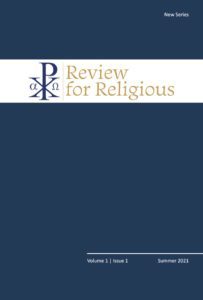We invite you to preview Review for Religious 1, no. 1 (Summer 2021)!
The first print issue of the relaunched Review for Religious is out, featuring:
- a broad array of research on religious life, from a variety of disciplines (psychology, theology, sociology, history, and pedagogy)
- a diverse set of authors – men and women religious, sisters, brothers and priests, from around the world
- book reviews, CARA Notes, and an editorial introduction to the new series!
You may preview the issue by downloading the table of contents and by reading excerpts below. And don’t forget – Card. Michael Czerny, SJ’s article “Religious Life from Vatican II to Fratelli Tutti” is available for free to read!
Excerpts From the First Issue
Trinitarian prayer often appears in the context of Favre’s desire to live his vows, particularly his vow of chastity, more fruitfully. Favre’s strategy is both historically interesting and, I hope, potentially illuminating for contemporary religious desiring to live a generative vowed life—and, indeed, for Christians in
every state of life.
The value of religious life is not to be found in what we do, but who we are and how we live. Through the public living of the vows, religious life has a capacity to evangelize and thus has apostolic value prior to the apostolic works that flow from it.
When Review for Religious paused publication in 2012, a series of significant events impacting religious life were about to unfold. To better understand the major trends in scholarship on religious life from these past nine years, it behooves us to look briefly and name a few of these realities.
Program evaluation outcomes as well as scholarship examining the Sisters’ Leadership Development Initiative program provide compelling evidence that professional leadership development for Catholic sisters in Africa can lead to positive change in African communities, which contributes to the fulfillment of the United Nation’s Sustainable Development Goals.
Even if not the original intention of John Paul II’s choosing the presentation of the Lord, the Christological underpinning of the feast as the “Feast of Encounter” has become an entirely new mode of articulating the Christology of consecrated life. Moreover, the annual sermons for this occasion have become part of the manner in which the Church thinks theologically about consecrated life. Prior to 1997, the presentation of the Lord is nowhere to be found in Catholic theologies of religious life or renewal. What follows is the unlikely but fruitful story of theological development.
A pressing question for religious who work in Catholic education at either the secondary or postsecondary level, particularly in the United States but also worldwide, is what exactly is Catholic about Catholic education in our present academic environment?
Today we understand ourselves to be beneficiaries of this extended period of discernment and renewal. We also know, anew, there is much to do. Some of the changes in religious life have produced realities for which current structures are proving woefully inadequate. The world has generated a challenging new agenda.
